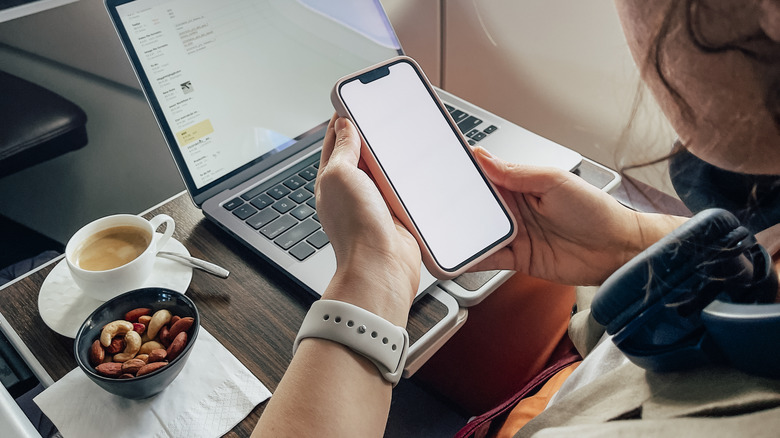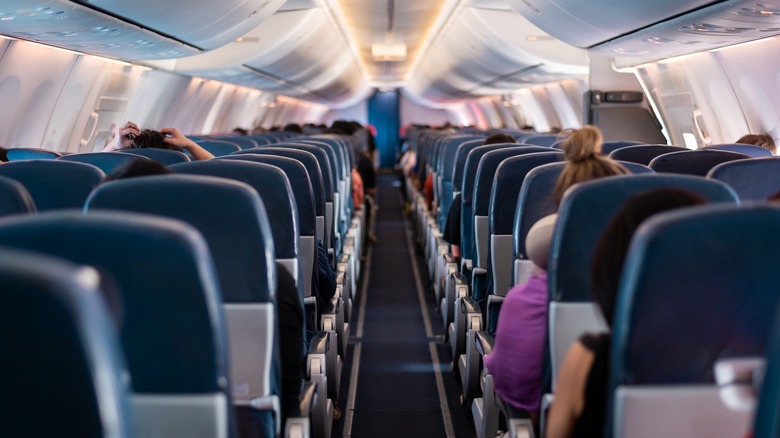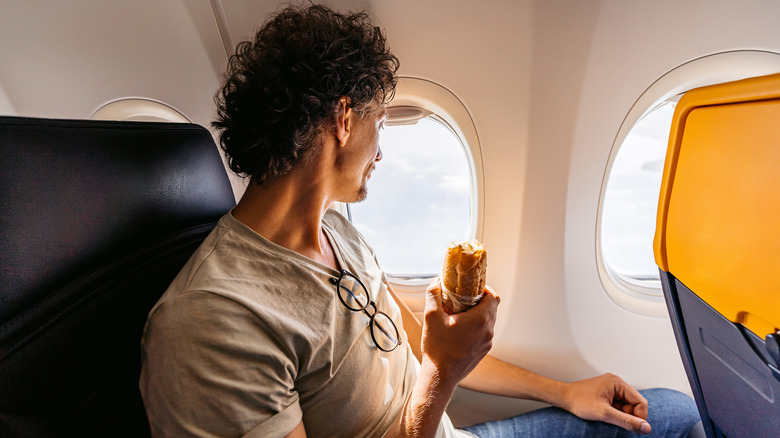Are You Allowed To Eat Peanuts On A Plane? A Flight Attendant Has The Answers
To stay comfortable and avoid disturbing your seatmate, there are some things you should simply never eat on a plane. This includes smelly foods, messy snacks, and anything that makes you bloated or gassy. But when it comes to peanuts and peanut-based ingredients (such as peanut butter), what's the best course of action?
Bagged peanuts were once a staple of commercial aviation culture, often handed out freely to passengers by flight attendants. These days, they've been replaced with pretzels, cookies, and other snacks due to the relatively high incidence of severe peanut allergies. Still, that doesn't mean you can't bring your own peanuts on board, according to Barbi, a journalist and veteran flight attendant with nearly 40 years of experience with a major U.S. carrier. "Many carriers no longer serve peanuts, but airlines cannot guarantee a nut-free flight as meals and snacks may contain nut or peanut oil, let alone control what other passengers bring on board to eat or snack on," Barbi revealed exclusively to Explore. Additionally, the experienced flight attendant adds that most airlines don't promise that their in-flight meals are completely free of nuts and other common allergens.
U.S. airlines offer few accommodations to passengers with peanut allergies
According to the American Academy of Allergy, Asthma & Immunology, an estimated 1-2% of Americans suffer from a peanut allergy. If you're one of them, you can take measures to advocate for yourself and plan for your next flight. Contacting the airline in advance is one option, though keep in mind that your carrier may not go to great lengths to meet your dietary needs. "Most U.S. carriers do not make special accommodations for those with nut allergies," reveals Barbi. "However, some non-U.S. airlines allow crews to make announcements asking passengers around the person with the allergy to refrain from eating nuts."
With that said, Barbi notes that some U.S. airlines offer priority boarding to passengers with peanut allergies so they can wipe down their seats and tray tables. Some companies are also known to create a nut-free "buffer zone" for fliers with severe allergies, as long as a request is made in advance. "It's always a good idea to check with the airlines before traveling to determine their policy regarding peanut allergies," Barbi says. Ultimately, if an airline is unwilling to accommodate you, you may want to book your journey with one that is.
Pack wisely when traveling with a severe allergy
There's no way of knowing what food your fellow fliers might have stashed in their bags. To reduce your risk of anaphylaxis, Barbi encourages those with peanut allergies to always travel with an EpiPen. "The Transportation Security Administration (TSA) allows for larger amounts of medically necessary liquids, gels, and aerosols for your trip, including EpiPens. You must declare your epinephrine pen to the TSA officer at the checkpoint for inspection," the expert shares. Be sure to always keep your EpiPen and other vital medications in your carry-on luggage in case you need to access them during your flight.
If you're nervous about bringing EpiPens and other allergy aids on board, Barbi suggests keeping a copy of your medical plan and a note from your doctor on hand. Show these documents to TSA officers if needed. You should also keep original prescription labels on any medications, according to Barbi.
When it comes to eating on the plane, you could request in-flight meals for dietary restrictions. But given that these meals aren't always free of allergens, Barbi recommends taking matters into your own hands. "It is always a good policy to bring your own food when you fly if you have any dietary issues, including severe nut allergies," she tells us. Solid foods and liquids in small quantities (in containers no larger than 3.4 ounces each) are permitted on planes, per TSA's guidelines.


